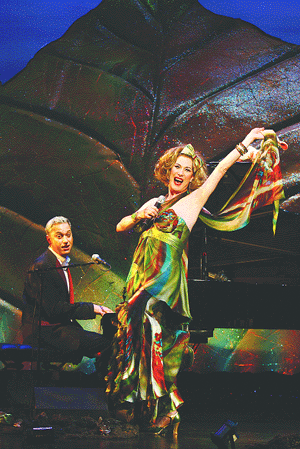What works in the cabaret faces a tough challenge on the big stage
<< Kenny Mellman as Herb and Justin Bond as Kiki appear for four weeks on Broadway in “Kiki & Herb: Alive on Broadway.” (Carol Rosegg )
If you are already a fan of the redoubtable lounge act Kiki & Herb, then you know—more or less—what you are in for. If you are not, they have a lot of explaining to do.
“Kiki & Herb: Alive on Broadway” capitalizes on their trademark brand of rant and roll that blends ingenious musicality with political commentary with camp and off-the-cuff—or I should probably say hem?—drag humor. Kiki is performed by Justin Bond and Herb by Kenny Mellman, and I’ve always looked forward to their shows as one of the more sophisticated and musically intelligent cabaret acts in town.
Alas, what works in a cabaret set has become bloated and tedious in their Broadway outing. Slated for only four weeks, the marketing seems calibrated to give a measurable number of die-hard fans exactly what they want. Economically, that’s savvy show biz. However, artistically, the show leaves a great deal to be desired. In making the jump to Broadway, the act has pulled up its creative stakes to pander to its demographic. It trades completely on the presumed familiarity with the characters and breaks no new ground, and one can’t help but think they took the tongue-in-cheek advice from “[title of show]”—“But original on Broadway? Baby, that is crazy”—to heart.
There are many elements that are frustrating about this show. For one, the amateur sound design by Brett Jarvis would be an embarrassment in a high school gymnasium, as it either obscures lyrics or is completely imbalanced and tinny and makes listening to the show often downright unpleasant.
More importantly, however, the kind of political diatribe in which the show often engages is the type of lazy, cowardly, facile pot stirring that characterizes the work of Jackie Mason or the “news” of Bill O’Reilly. Whether it comes from the left or the right, trying to score points by mouthing opinions that are presumably shared by a self-selecting audience is simply offensive, though definitely a fixture of our culture today. It is, however, anything but bold, and fearless truth telling. It is the endemic problem of political theater, and cable news, today—it offers opinion and emotion but no solution. It is a quasi-incendiary statement that assumes a specific response rather than offering artistic interpretation of a painful reality.
It is also that old show biz tradition of giving people what they want. That’s fine for a revival of “Camelot,” but not for something that promotes itself as—that loathsome word—“edgy.”
Set aside that I personally agree with Kiki’s premise that the treatment of gays, lesbians, and transgendered people in this country establishes a de facto culture of apartheid, I don’t need it repeated by a drag queen who has nothing new to say on the subject. On Broadway, it becomes simple pandering to a presumed point of view to get applause, and that, to the point here, is just plain boring theater.
Nonetheless, it’s hard to blame Kiki & Herb for trying to capitalize on the zeitgeist. After all, at the end of the day, their job is to sell tickets, and the show is not without its high points. Structurally, the show is a sequence of disconnected monologues, some working better than others. The explanation of how and why Kiki & Herb are immortal hinges on the premise that they were present at the Nativity. It is perhaps the best and the smartest of the monologues because it subtly and acidly skewers the improbable, implausible storytelling that makes up a religion of any stripe. There are wonderfully funny lines throughout, but I won’t wreck those for you here because that would be like putting all the best parts of a movie in the trailer.
The best part of the show is the music, even when it’s badly distorted. It includes a variety of songs from Public Enemy, The Cure, The Scissor Sisters, The Mountain Goats, and many others that are well chosen for the patter and generally well performed. One of the things that has always been remarkable about Bond as Kiki is the ability to layer the performance of a song with complex subtext. Bond is no singer in the classic sense, but like the ageless chanteuse he portrays, the ability to infuse a song with experience is still going strong. It’s unfortunate that that level of intelligence and remarkable talent is not consistently applied in the show as a whole.
Perhaps if the show were trimmed by 45 minutes—it comes in at nearly two-and-a-half hours—the flaws would not be as evident. We could have a campy time and ride along on the energy of the performers alone, without too much thinking, kind of like “Mamma Mia!” But when pandering crowds out without real art, the tendency is to nod off, to, if you will, sleep away camp.
gaycitynews.com


































